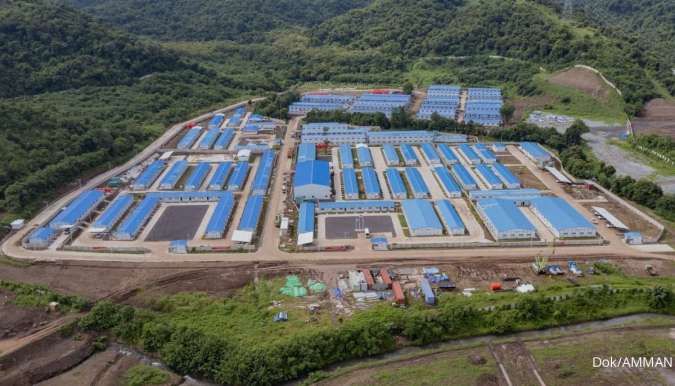FINTECH - JAKARTA. The Financial Services Authority (OJK) has introduced a number of new regulations in SEOJK No.19/SEOJK.06/2023 regarding the Implementation of Joint Funding Services Based on Information Technology (LPBBTI) which will take effect from January 1, 2024.
The SEOJK includes various rules for fintech peer-to-peer (P2P) lending, including interest rate reduction, debt collection, repayment capacity, and limiting borrowing to only three platforms.
In response to these changes, several fintech P2P lending companies have stated that they have made adjustments in accordance with the new regulations. One of these is the fintech P2P lending company PT Sahabat Mikro Fintek (SAMIR).
Regarding the interest rate reduction, SAMIR's Public and Government Relation, Balqis, said they will first analyze the financial impact.
"After that, we will re-analyze the risk to borrowers and adjust interest rates based on their risk profile. We will also diversify our loan portfolio to reduce risk and maintain business sustainability," she revealed to Kontan.co.id, Sunday (31/12).
Read Also: AdaKami Ready to Comply with New OJK Regulations Effective This Year
Regarding the implementation of the new collection regulations, Balqis said SAMIR will start by updating collection procedures, training staff, implementing technology that facilitates the collection process, and evaluating collection vendors to ensure compliance with SEOJK Number 19.
In accordance with the new rules, updates to the risk assessment model, she said they will look at the feasibility and ability of potential borrowers to meet payment obligations, namely character and repayment capacity, with a more cautious approach to borrowers with low repayment capacity.
In addition, regarding borrowers only being allowed to borrow on three platforms, Balqis said the positive impact of this regulation for her company is the potential for improved borrower quality and risk control.
"With the limitation of the number of platforms, the company can focus more on analyzing borrower profiles and managing the loan portfolio more effectively. This can certainly reduce credit risk and strengthen lender trust," she said to Kontan.co.id, Thursday (28/12).
Balqis mentioned another impact, namely the potential for limited access to funding for borrowers. In addition, she said if not managed well, the regulation could also affect the company's performance by reducing funding volume and potentially reducing profits.
To implement these new policies, Balqis said the company will focus more on diversifying products and services that meet market needs. In addition, she said, SAMIR will also strengthen cooperation with other financial institutions as a strategy to face limited access to funding.
Regarding the fulfillment of IDR 7.5 billion in capital by the end of this year, SAMIR believes this will be achieved.
"Of course, involving the company's financial analysis and cooperation with stakeholders, including shareholders and other stakeholders," she said.
Balqis explained that since its establishment until the end of November 2023, SAMIR has disbursed funding of IDR 647.62 billion.
Meanwhile, fintech P2P lending Modalku also spoke up about the new OJK regulations that will take effect this year. Regarding the rule of reducing interest rates, Modalku's Country Head Indonesia, Arthur Adisusanto, said the reduction is still in line with the maximum interest rate charged by Modalku.
"Therefore, it does not have much impact on Modalku's business operations," he said to Kontan.co.id, Monday (1/1).
Regarding the new collection rules, Arthur said Modalku has met most of the collection requirements stipulated in SEOJK Number 19 of 2022. He said this has also been incorporated into internal SOPs and cooperation agreements with collection partners.
Regarding other matters, Arthur said Modalku is in the process of adjusting both the technical and non-technical aspects of the collection implementation, which is planned to be completed and can be effectively implemented in January 2024.
Although focused on productive funding, Arthur explained that Modalku can also apply the repayment capacity rule to MSMEs. One way is by using financial reports or account mutations of potential fund recipients as assessment indicators.
In addition, Modalku does not deny that there are positive and negative impacts from the rule of borrowing only on 3 platforms. According to Arthur, the rule can help reduce the risk of excessive funding for potential fund recipients who tend to borrow from many fintech platforms simultaneously.
Thus, it can reduce the risk of default. "However, the rule also has an impact on the reduction of funding volume provided by the company. This is because potential fund recipients or MSMEs who already have active funding from three platforms cannot be served, no matter how good their potential," he revealed.
However, Arthur hopes that with these regulations, the digital funding industry can be more sustainable through the application of prudential principles and risk management in carrying out the funding process.
To face these new policies, Arthur said Modalku will continue to prioritize strategy adaptation, focus on better service, and a smarter approach in selecting potential fund recipients.
"We will continue to adapt to offer services or products that are tailored to the characteristics of MSMEs," he said.
Regarding the rule that capital must be IDR 7.5 billion effective two years from POJK No 10/2022. Arthur said Modalku has met the capital requirements set by the OJK. Therefore, there is no additional strategy to meet these requirements.
So far, Arthur said the Modalku Group has disbursed more than IDR 55 trillion in funding to more than 5.1 million MSME loans in Indonesia, Singapore, Malaysia, Thailand, and Vietnam.
On the other hand, fintech P2P lending PT Pembiayaan Digital Indonesia (AdaKami) stated that it is ready to implement the new OJK regulations this year. AdaKami Brand Manager Jonathan Kriss said they will follow the rule on interest rate reduction.
"AdaKami's daily fees will drop to 0.3% effective for loans applied for per January 1, 2024. Fee adjustments have been calculated and can be effectively implemented in accordance with SEOJK," he said to Kontan.co.id, Sunday (31/12).
Regarding the new collection and repayment capacity rules, Jonathan said AdaKami has no difficulty in fulfilling these regulations. He said all operational processes will be adjusted.
He also said AdaKami is ready to meet the capital rule of IDR 7.5 billion effective two years from POJK Number 10/2022. Jonathan said that as of December 29, 2023, funding disbursement has reached more than IDR 14 trillion.
Regarding the new OJK regulations, Observer and Director of the Digital Economy Center of Economic and Law Studies (Celios), Nailul Huda, welcomed them, including interest rates or benefits from online loans because they aim to protect consumers.
According to him, consumers will get a much more competitive interest offer from online loan platforms. However, the more competitive offer must also be balanced with perfect information to the public.
"Don't let there be hidden costs that make the loan interest much larger," he said.
Nailul also said the new rules will create clear provisions for fintech P2P lending players who were once hit by cartel issues from the Business Competition Supervisory Commission (KPPU).
In addition, he hopes the OJK can also evaluate the determination of interest rates every 3 months with stakeholders, such as the Indonesian Joint Funding Fintech Association (AFPI).
Nailul explained that the interest rate reduction seems to be able to impact the interest of lenders. Therefore, he said fintech lending must be able to attract lenders from banking or other institutions.
"The hope is that productive sector funding can be obtained from both banking and non-banking institutions," he said.
/2023/11/15/2043646930p.jpg)













